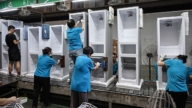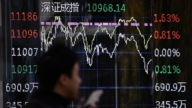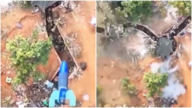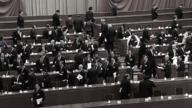【新唐人2013年10月31日訊】「還在銀行存錢嗎?存款不再絕對安全了!」日前,大陸多家媒體紛紛報導,央行將在今年年底或明年年初將推行銀行存款保險制度,允許銀行破產。如果銀行陷入破產,將不可能全部兌現儲戶存款,存款人的利益將會受到直接損害,也就是說,百姓的錢存在銀行也不再絕對安全。
據報導,中國人民銀行原副行長,中國金融會計學會會長馬德倫透露,中國銀行存款保險制度的設計已經基本完成,即將出臺。
所謂銀行存款保險制度,是指銀行按照一定比例標準,向特定機構繳納一定保險金,當自身發生兌付風險、破產等危機時,由存款保險機構通過資金援助等方式,來保障銀行的清償能力。在這一制度下,一旦銀行發生破產倒閉等事件,儲戶存放在銀行的資金不至於顆粒無收。
長期以來,大陸一直是由政府和中央銀行對存款提供隱形擔保,存款銀行要按規定向央行繳納16.5%到20%的存款準備金,當存款銀行出現風險,政府會出面兜底,因此本金一般不會受到影響。
例如1998年,海南發展銀行因不能按時清償債務而關閉,最後由央行指定工商銀行託管它的債權債務,保證支付大陸居民在這家銀行的儲蓄存款本金及合法利息。
既然已經有存款儲備金,為甚麼還要搞存款保險制度?
專家認為,種種跡象表明,中共當局已經意識到了大陸金融體系即將崩潰的危機,並且不願為此承擔任何風險。
中國金融分析師任中道:「它就是想把所有的危機往外轉嫁出去,本身它有存款儲備金,各銀行收100塊錢,得交20塊錢給央行,這就相當於一種存款保險了。它現在還要做這個,就相當於它完全不想負擔這個危機。」
據了解,今年中國有16家上市銀行的不良貸款餘額上升,16家銀行不良貸款餘額達4,400億元,相比去年年末增加了近400億元。
9月3號,國際著名評級機構「標準普爾(Standard & Poor’s)」,就《中國50大銀行報告》進行解讀,「標普」認為,中國的中小金融機構,將在即將面臨的三大風險中,先行破產。三大風險包括出口、產能過剩、和地方債。
很多金融評論也指出,當前大陸銀行系統風險越來越高,一方面與地方政府債務高度捆綁,形成巨大的貸款黑洞和無數呆賬、壞賬。另一方面由於央行基礎貨幣的超發,導致銀行無節制的發放貸款。
任中道:「它為甚麼風險大,就是它不斷的放貸出去,結果現在收不回來,就產生了這樣的壞賬,它沒有錢。為甚麼現在好像錢荒又來了,就是它已經放出去,收不回來。另外被中共內部他們這些權貴太子黨給瓜分掉了這些錢,所以它錢肯定十分緊張,很脆弱了,現在。」
今年初,國際資本機構就中共地方債務風險以及銀行表外貸款的風險,不斷發出警告﹔《經濟學人》雜誌刊登一篇〈 尋找下一個雷曼兄弟 〉的文章,暗喻大陸正成為下一個雷曼兄弟。原因是,大陸自2008年以來,債務爆炸增長。據估計,大陸債務佔GDP比重已經超過200%。
中國金融分析師任中道認為,一旦中國銀行系統崩潰必將引發金融海嘯,並將直接影響到中共政權。但目前危機已經形成,中共也無力回天,只好將風險轉嫁到百姓身上。
任中道:「中共當局對於現在金融危機的處理已經不能它內部消化,也就是說,國家的信用、政府的財政已經化解不了這個危機,因此必須把這個危機給轉嫁出去,所以中共央行用『存款保險』的名義,瞞天過海繼續來忽悠老百姓。」
大陸未來存款保險機構可能實行限額保險制,對每個銀行賬戶的保險上限,初步設定為50萬元人民幣,也就是最多賠付50萬。
中國百姓感嘆:存在銀行的錢越多,越不安全啊!
採訪編輯/張天宇 後製/李勇
China’s Issuing Deposit Insurance May Put the Public at Risk
“Are you still keeping a bank deposit?
It might not be safe any more!"
Reports of China’s central bank launching a bank-deposit
insurance system has many Chinese saying these words lately.
With this system, depositors won’t totally lose all their deposits
should the bank fail.
This shows having bank savings in China is no longer secure.
Ma Delun, former vice-chair of the People’s Bank of China,
revealed recently in a financial forum that
a bank deposit insurance system proposed by the central bank
is ready to be launched.
With a bank deposit insurance system,
the bank pays with a certain proportion of the standard
to receive financial assistance when the bank is facing risks
or bankruptcy.
Under the system, depositors will be able to retrieve
some of their savings should the bank fail.
Over the years, China’s government and central bank
have provided invisible guarantees to deposits.
The Chinese banks have been paying the central bank
in the range of 16.5% to 20% for deposit reserve.
The government generally assist the depositors and
the failing banks.
Take the Hainan Development Bank as an example,
the bank closed in 1998 over debt problems.
The central bank relayed its debt to the Industrial and
Commercial Bank of China to pay back the savings
and interest to Hainan Development Bank depositors.
Why is a bank deposit insurance system needed
on top of this deposit reserve?
Experts say these are signs showing
the Chinese Communist regime is not willing to cover the loss,
realizing mainland China’s financial system is collapsing.
Financial analyst Ren Zhongdao: “It is shifting the risk.
The bank has to pay 20 dollars to the central bank for
every 100 dollar deposit as a reserve.
It is equivalent to a kind of deposit insurance.
With the new bank deposit insurance,
the government is saying it’s no longer covering the risk. “
There are 16 listed banks with increasing
non-performing loans this year.
The total non-performing loans have amounted
to 440 billion yuan ($72 billion), which is nearly a 40 billion
yuan ($6.5 billion) increase compared to late last year.
According to a study by Standard & Poor’s on Sept. 3,
out of China’s top 50 Banks, small and medium banks
are highly exposed to the three major crises in the areas of
export, oversupply and local government debt.
In the event of crisis, these banks will go bankrupt first.
Many financial commentators have also pointed out
that the banks in China are highly vulnerable.
The tight relations with off-budget local debts
have created countless bad debts on one hand,
and the unrestricted bank loans due to
excessive money printing on the other.
Ren Zhongdao: “Unrestricted loans have created a huge risk
because of too much bad debt.
The money shortage was thus created.
The Communist bigwigs such as the princelings
have also participated to share the pie.
The whole financial system is extremely fragile."
Earlier this year, international finance institutions
have warned China of the risks of high local debts and
interbank borrowings.
The Economist published the article, Where’s the next Lehman,
inferring that China is the next big bankruptcy case.
The reason is that credit growth in China
is estimated to be over 200% of its GDP.
Financial analyst Ren Zhongdao says that a financial tsunami
is inevitable once the Chinese banking systems collapse.
It will pose direct impact on the Chinese Communist regime.
The regime has realized the current crisis is unsolvable
and thus is shifting the risk to the people.
Ren Zhongdao: “The Communist authorities can no longer
handle the domestic financial crisis.
Its credibility and financial organs can no longer resolve it.
The central bank is issuing this bank-deposit insurance
to deceive the public while shifting the crisis onto the people."
The coming bank deposit insurance may have a limit
of 500,000 yuan ($82,000), meaning people
can get compensation of 500,000 yuan at most.
Chinese people lament, saying:
The more you save in the bank, the riskier it is!
Interview Edit / Zhang Tianyu Post-production /




























